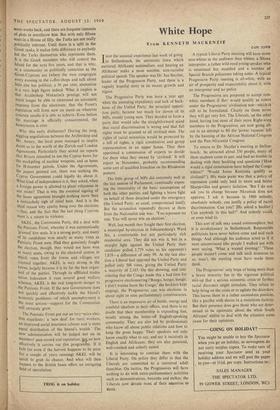White Hope
H MACKENZIE From KENNET
CAPE TOWN
HAD the unusual experience last week of going Ito Stellenbosch, the university town which nurtured Afrikaner nationalism, and hearing an Afrikaner make a most sensible, non-racialist political speech. The speaker was Dr. Jan Steytler, leader of the Progressive Party, and there is a vaguely hopeful story in its recent growth and vigour.
The Progressive Party was born a year ago when the unending expediency and lack of back- bone of the United Party, the principal opposi- tion party, became too much for eleven of its MPs, mostly young men. They decided to form a party that would take the straightforward stand that racial discrimination is wrong and that full rights must be granted to all civilised men. The rights of racial minorities would be protected by a bill of rights, a rigid constitution and group representation in an upper house. They then appointed a commission of experts to decide for them what they meant by 'civilised.' It will report in November, probably recommending some sort of qualified franchise on the Rhodesian pattern.
The little group of MPs did extremely well in the last session of Parliament, continually expos- ing the immorality of the basic assumptions of both the other parties, and fighting a brave fight on behalf of those detained under the emergency (the United Party, as usual, compromised itself). But the accusation repeatedly thrown at them from the Nationalist side was: 'You. represent no one. You will never win an eledtion.'
Well, last month they fought their first election, a municipal by-election in Johannesburg's Ward Six, a comfortable but not particularly rich residential area. They did not win it, but in a straight fight against the United Party their candidate polled 1,779 votes to his opponent's 1,878—a difference of only 99. At the last elec- tion a Liberal had opposed the United Party and polled only 508 votes, giving the United Party a majority of 2,165. On this showing, and con- sidering that the Congo made this a bad time for progressive electioneering (`Bongo, bongo, bongo, don't wanna leave the Congo,' the hecklers kept singing), the Progressives can win -elections in about eight or nine parliamentary constituencies.
There is an impressive air of bustle, energy and youthful idealism in their offices, and there is no doubt that their membership is expanding fast, mostly among the better-off English-speaking community. They are also led by professionals who know all about public relations and how to keep the press happy. Their speakers not only know exactly what to say, and say it incisively in English and Afrikaans; they are also punctual, well-combed and soberly suited.
It is interesting to contrast them with the Liberal Party. On policy they differ in that the Liberals are committed to a universal adult franchise. On tactics, the Progressives will have nothing to do with extra-parliamentary activities such as demonstrations, boycotts and strikes; the Liberals now devote most of their attention to them. A typical Liberal Patty meeting will have more non-whites in the audience than whites; a Xhosa interpreter, a rather wild-eyed young speaker who is emotional but muddled and a number of Special Branch policemen taking notes. A typical Progressive Party meeting is all-white, with an air of prosperity and respectability about it. with no interpreter and no police.
The Progressives are prepared to accept non- white members if they would qualify as voters under the Progressives' civilisation test—which is still to be formulated. Clearly on those terms they will get very few. The Liberals, on'the other hand, having lost most of their more Right-wing members to the Progressives, are now going all- out in an attempt to fill the 'power vacuum' left by the banning of the African National Congress and the Pan-Africanist Congress.
To return to Dr. Steytler's meeting at Stellen- bosch: he attracted about 350 people, many of them students come to jeer, and had no trouble in dealing with their heckling and questions (How would a rigid constitution have helped the Congo whites?' Would Jomo Kenyatta qualify as civilised?'). His main point was that a policy of repression could only lead to more and better Sharpevilles and greater isolation. 'But I do not ask you to change because Nkrumah does not approve, I ask it because in 1960 nobody, absolutely nobody, can justify a policy of racial discrimination. Can you? [He asked a heckler.] Can anybody in this hall?' And nobody could, or even tried to.
This sort of, talk may sound commonplace, but it is revolutionary in Stellenbosch. Responsible politicians have never before come and said such things. And although his audience acted as if it were unconvinced (the people I walked out with were saying, 'What a wasted evening!' These people mustn't come and talk such nonsense to us, man'), the meeting must have made them think.
The Progressives' only hope of being more than a brave minority lies in the vigorous political mix-up that a serious economic crisis'or further racial disorders might stimulate. They refuse to help bring on the crisis or to agitate the disorders. This leaves them in a rather anomalous position, like a pacifist with shares in a munitions factory. But their presence does give those who are deter- mined to be optimistic about the white South Africans' ability to deal with the situation some cause for their optimism.


































 Previous page
Previous page